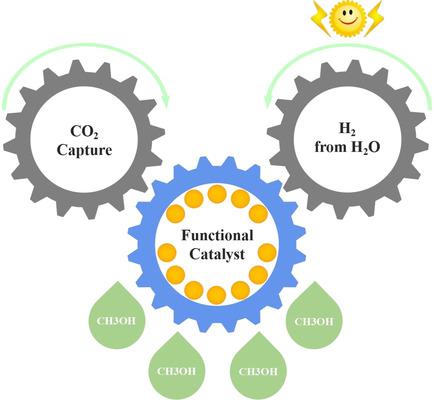当前位置:
X-MOL 学术
›
ChemSusChem
›
论文详情
Our official English website, www.x-mol.net, welcomes your
feedback! (Note: you will need to create a separate account there.)
Hydrogenation of Carbon Dioxide to Methanol over Non−Cu‐based Heterogeneous Catalysts
ChemSusChem ( IF 7.5 ) Pub Date : 2020-11-04 , DOI: 10.1002/cssc.202002054 Feng Sha 1, 2 , Zhe Han 1, 2 , Shan Tang 2 , Jijie Wang 2 , Can Li 2
ChemSusChem ( IF 7.5 ) Pub Date : 2020-11-04 , DOI: 10.1002/cssc.202002054 Feng Sha 1, 2 , Zhe Han 1, 2 , Shan Tang 2 , Jijie Wang 2 , Can Li 2
Affiliation

|
The increasing atmospheric CO2 level makes CO2 reduction an urgent challenge facing the world. Catalytic transformation of CO2 into chemicals and fuels utilizing renewable energy is one of the promising approaches toward alleviating CO2 emissions. In particular, the selective hydrogenation of CO2 to methanol utilizing renewable hydrogen potentially enables large scale transformation of CO2. The Cu‐based catalysts have been extensively investigated in CO2 hydrogenation. However, it is not only limited by long‐term instability but also displays unsatisfactory catalytic performance. The supported metal‐based catalysts (Pd, Pt, Au, and Ag) can achieve high methanol selectivity at low temperatures. The mixed oxide catalysts represented by MaZrOx (Ma=Zn, Ga, and Cd) solid solution catalysts present high methanol selectivity and catalytic activity as well as excellent stability. This Review focuses on the recent advances in developing Non−Cu‐based heterogeneous catalysts and current understandings of catalyst design and catalytic performance. First, the thermodynamics of CO2 hydrogenation to methanol is discussed. Then, the progress in supported metal‐based catalysts, bimetallic alloys or intermetallic compounds catalysts, and mixed oxide catalysts is discussed. Finally, a summary and a perspective are presented.
中文翻译:

非铜基非均相催化剂上二氧化碳加氢制甲醇
大气中CO 2水平的增加使得减少CO 2成为世界面临的紧迫挑战。利用可再生能源将CO 2催化转化为化学品和燃料是减少CO 2排放的有前途的方法之一。特别地,利用可再生氢将CO 2选择性氢化成甲醇潜在地使CO 2大规模转化成为可能。铜基催化剂已在CO 2中进行了广泛研究氢化。但是,它不仅受到长期不稳定的限制,而且还表现出令人满意的催化性能。负载型金属基催化剂(Pd,Pt,Au和Ag)可在低温下实现高甲醇选择性。以M a ZrO x(M a= Zn,Ga和Cd)表示的混合氧化物催化剂具有高的甲醇选择性和催化活性以及优异的稳定性。这篇综述集中在开发非铜基非均相催化剂的最新进展以及对催化剂设计和催化性能的当前理解。首先,CO 2的热力学讨论了氢化成甲醇。然后,讨论了负载型金属基催化剂,双金属合金或金属间化合物催化剂和混合氧化物催化剂的研究进展。最后,总结和展望。
更新日期:2020-12-07
中文翻译:

非铜基非均相催化剂上二氧化碳加氢制甲醇
大气中CO 2水平的增加使得减少CO 2成为世界面临的紧迫挑战。利用可再生能源将CO 2催化转化为化学品和燃料是减少CO 2排放的有前途的方法之一。特别地,利用可再生氢将CO 2选择性氢化成甲醇潜在地使CO 2大规模转化成为可能。铜基催化剂已在CO 2中进行了广泛研究氢化。但是,它不仅受到长期不稳定的限制,而且还表现出令人满意的催化性能。负载型金属基催化剂(Pd,Pt,Au和Ag)可在低温下实现高甲醇选择性。以M a ZrO x(M a= Zn,Ga和Cd)表示的混合氧化物催化剂具有高的甲醇选择性和催化活性以及优异的稳定性。这篇综述集中在开发非铜基非均相催化剂的最新进展以及对催化剂设计和催化性能的当前理解。首先,CO 2的热力学讨论了氢化成甲醇。然后,讨论了负载型金属基催化剂,双金属合金或金属间化合物催化剂和混合氧化物催化剂的研究进展。最后,总结和展望。

































 京公网安备 11010802027423号
京公网安备 11010802027423号